Can You Work Remotely in Portugal?
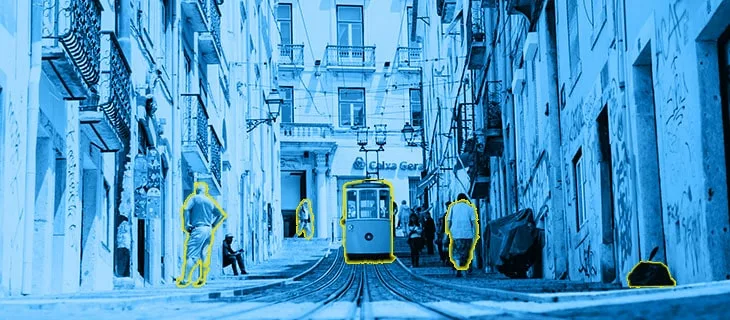
There are some gray areas when it comes to working remotely in foreign countries as a digital nomad. We often receive the question, can you work remotely in Portugal?
Yes, you can work remotely in Portugal as a digital nomad.
As of 2022, Portugal even recognized the growing trend of working remotely and launched the official Portugal digital nomad visa, allowing remote workers to live in the country for at least a year!
Whether you are a tourist staying less than 90 days in Portugal or decide to live there temporarily, you can work remotely in Portugal.
In this article, we will dive into the specifics of what it’s like to work remotely in Portugal, both as a tourist and a temporary resident, to help you make the most out of your workcation.

Digital Nomads in Portugal
Digital nomads have been flocking to Portugal for the last five years in droves. From the world’s first digital nomad village in Madeira opening in 2021 to the sunny weather in Lisbon, remote workers have been making Portugal home.
They decide to explore or settle down in the best cities for digital nomads in Portugal, such as Lisbon, Porto, Coimbra, and Lagos. They offer beautiful accommodations, local culture, and cafes or coworking spaces perfect for remote workers.
From delicious food, stunning beaches, bustling cities, and an affordable cost of living, Portugal is easily becoming Europe’s hot spot for digital nomads.
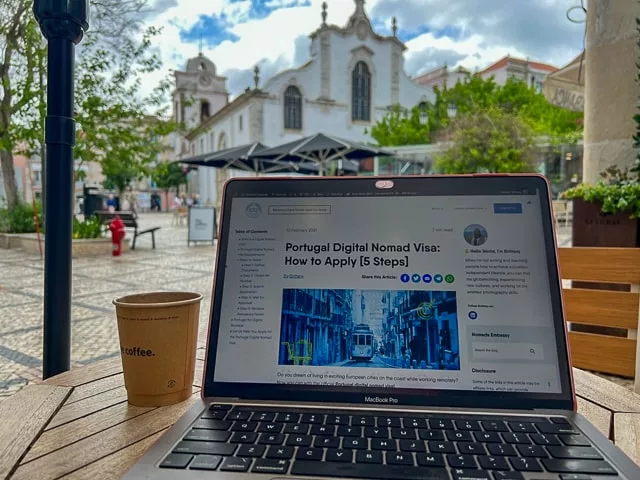
Can You Work Remotely in Portugal?
Yes, you can work remotely in Portugal as a digital nomad.
If you are a tourist and staying less than 183 days out of the year, you are free to work remotely in Portugal. Remember, most nationalities can stay in Portugal for 90 days out of a period of 180 days on a tourist visa.
Digital nomads who wish to relocate to Portugal to live and stay for at least a year can apply for Portugal’s digital nomad visa and work remotely in the country.
See if you’re eligible for Portugal’s digital nomad visa
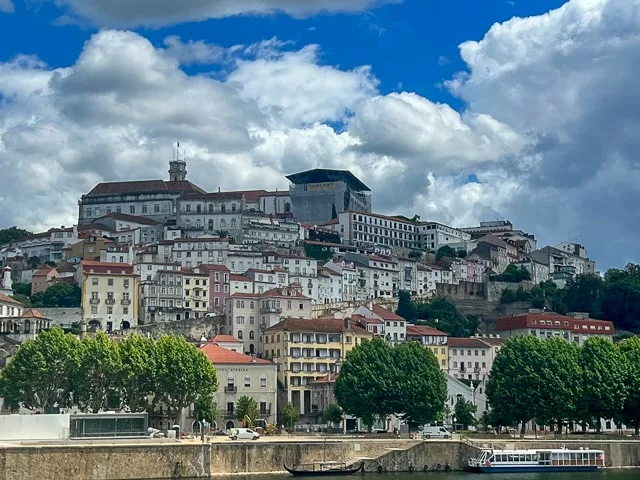
How Long Can You Stay and Work Remotely in Portugal?
If you apply for the digital nomad visa in Portugal, then you can stay for either one or two years and work remotely.
However, if you plan to be a tourist, then you can stay for 90 days in a 180-day period, depending on your nationality. Some nationalities can only stay for 30 days on a tourist visa.
If you choose to work remotely in Portugal as a tourist, then we recommend spending less than 183 days out of the year in the country to avoid complicating your situation, overstaying your tourist visa, and becoming subject to paying local taxes. (More on this later!)
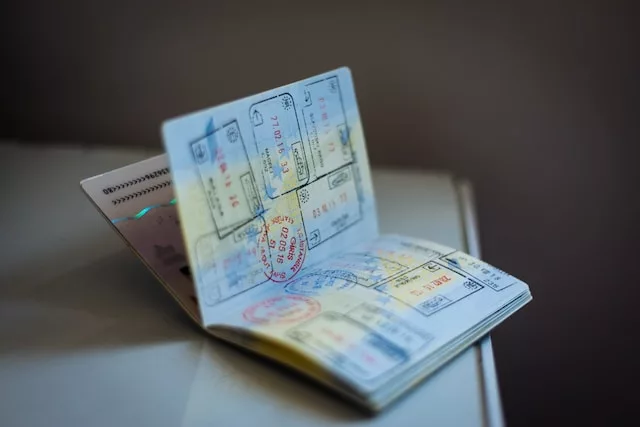
Portugal Visa Options for Digital Nomads
Portugal is one of the few countries that offer multiple visa options for digital nomads to relocate to the beautiful country.
Portugal Digital Nomad Visa (D8)
Portugal launched its official digital nomad visa in October 2022. In the first year, it accepted 2,600 digital nomad visa applications in the first year.
The Portugal digital nomad visa allows you to work remotely in Portugal for either 12 months or two years when you apply for a temporary residence permit. The residence permit is renewable and can lead to permanent residency.
To qualify for Portugal’s digital nomad visa, you must meet the following criteria:
- Work remotely, earning income from outside of Portugal
- Earn at least 3,280€ per month (income increases with family members)
- Have a clean criminal record for the last five years
- Proof of international health insurance of at least 30,000€ in coverage
- Possess a valid passport
The visa allows you to bring family members and work remotely in Portugal while enjoying the beautiful lifestyle benefits the county offers.
Portugal Passive Income Visa (D7)
Some digital nomads make their living through passive income, such as investments, dividends, pensions, or rental income. The Passive Income or D7 visa was utilized by digital nomads before the official D8 visa was released.
So, while the D7 visa doesn’t necessary allow you to work remotely in Portugal, it does allow you to live in the country while earning passive income from abroad.
With the D7 visa, passive income earners can live in Portugal for two years with a renewable residence permit. After five years of continuously living in Portugal, they may apply for permanent residency.
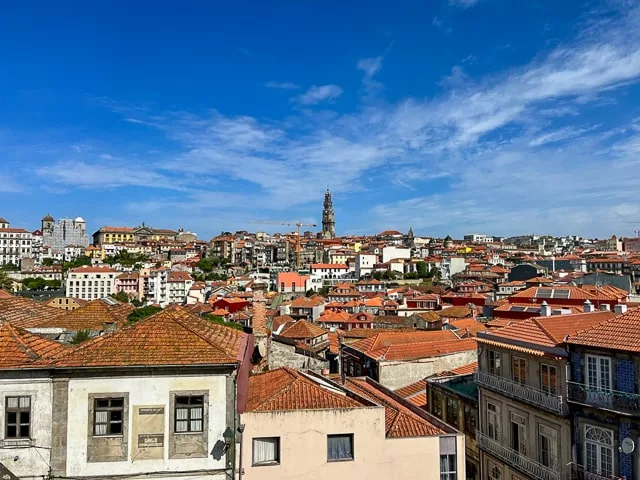
What is it Like to Work Remotely in Portugal?
While walking through the streets of Lisbon or Porto, it won’t be out of the ordinary to see people sitting at cafes working on their laptops with a pastel de nata on a dish next to them.
Portugal is extremely friend to remote workers with plenty of cafes offering free wifi and coworking spaces with affordable day passes or monthly memberships.
Internet Speeds in Portugal
The internet speed in Portugal is optimal!
You’ll easily find fast wifi throughout the country. With 95% of households covered by 100 Mbps broadband internet, cafes and coworking spaces offer the same.
The average download speed for broadband in Portugal 163 Mbps, while the mobile download speed is 103 Mbps, according to Ookla.
So, connecting to wifi at a cafe, city wifi, or simply using your mobile hotspot, you’re guaranteed to have reliable internet in Portugal.
Places to Work Remotely in Portugal
Large cities, such as Lisbon and Porto host plenty of coworking spaces where digital nomads can rent a hot desk or even a full office for a day or a month at a time.
Check out the most popular coworking spaces in Lisbon
My personal favorite way to work remotely in Portugal is by hopping around cafes. There were some great digital nomad-friendly cafes in Porto that I grew to love while also enjoying delicious meals and satisfying coffee.
It isn’t strange or unusual to pull out your computer while out and about in Portugal. Just remember to respect the place’s rules. Sometimes, there are designated tables or times when a restaurant or cafe will allow you to work remotely in Portugal.
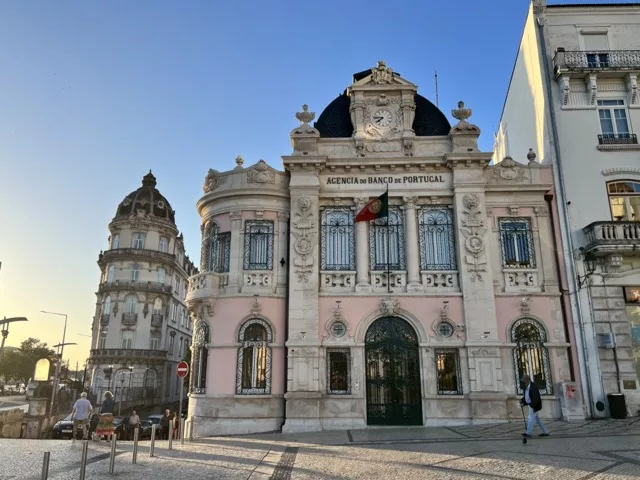
Will You Owe Taxes if You Work Remotely in Portugal?
If you know anything about being a digital nomad, you’ll know that taxes can be quite complicated, especially when working remotely in different countries.
So, do digital nomads pay tax in Portugal?
The answer depends on how long you stay in Portugal or if you have a domicile or residence there.
For those who apply for the digital nomad visa in Portugal, you will owe local taxes. However, if you work remotely in Portugal as a tourist and spend less than 183 days in the country, then you will not have to pay taxes in Portugal.
It’s always a good idea to speak with a professional accountant about your tax situation as a digital nomad to avoid penalties or costly mistakes.
Is it Legal to Work Remotely in Portugal?
It is completely legal to work remotely in Portugal as long as you have the right visas and permits.
If you are a tourist staying less than 90 days, you can freely work remotely in Portugal.
If you wish to live in Portugal longer than 90 days, then you’ll require either a digital nomad visa or the D7 passive income visa.

Relocate to Portugal with the Help of Nomads Embassy
Is it your dream to work remotely in Portugal for a year or more as a digital nomad?
Your dream can come true with Nomads Embassy: The World’s First Embassy for Digital Nomads!
We’ve partnered with hand-selected local immigration lawyers to assist you with your Portugal digital nomad visa application. With our Done-for-You Digital Nomad Visa Service, you can have dedicated personalized help with your application to ensure all of your documents are compliant and more.
Want to see if Portugal is the right country for you?
Request our free digital nomad visa eligibility assessment today!
You may also enjoy

The most complex and time-consuming part of applying for a digital nomad visa is gathering all of the right documents. To help get you started and hopefully save some time,…
by Brittany

Taiwan will be the latest country in Asia to welcome remote workers officially by introducing the Taiwan digital nomad visa. In an effort to attract at least 10% of the…
by Brittany
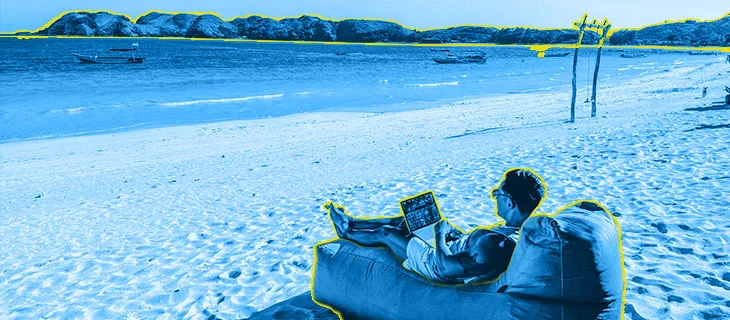
As a remote worker traveling the world, you’ve likely heard about the more than 40 digital nomad visas available worldwide. They’ve piqued your interest, but what are the signs you…
by Brittany
